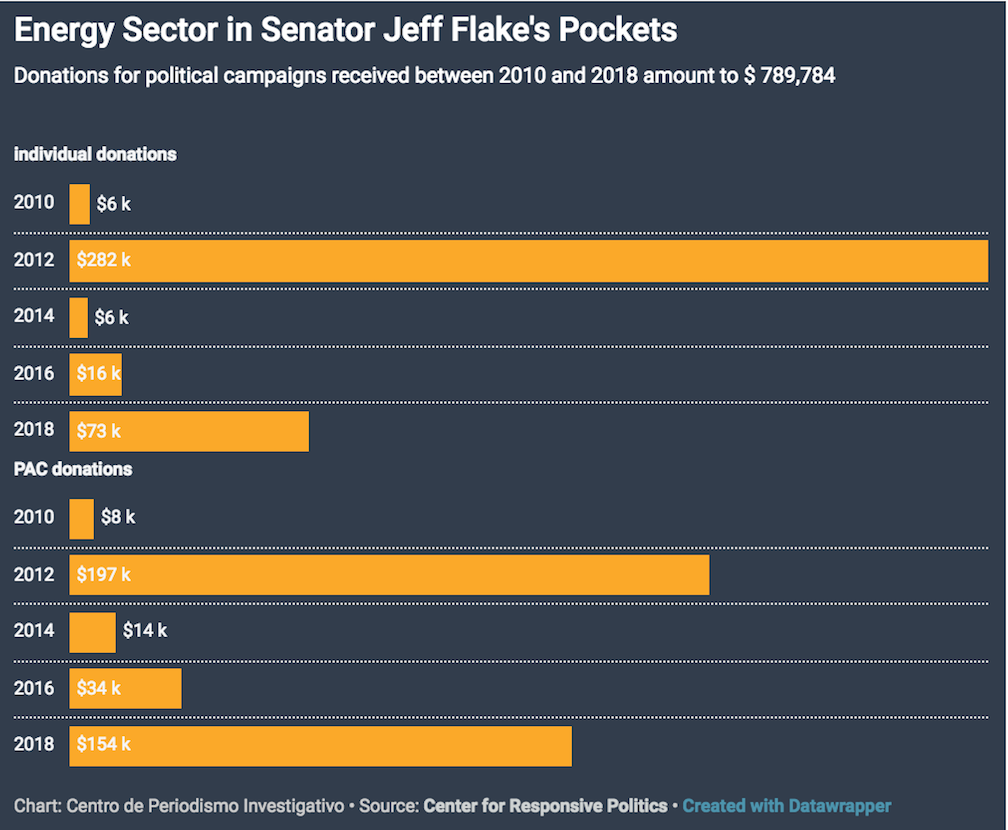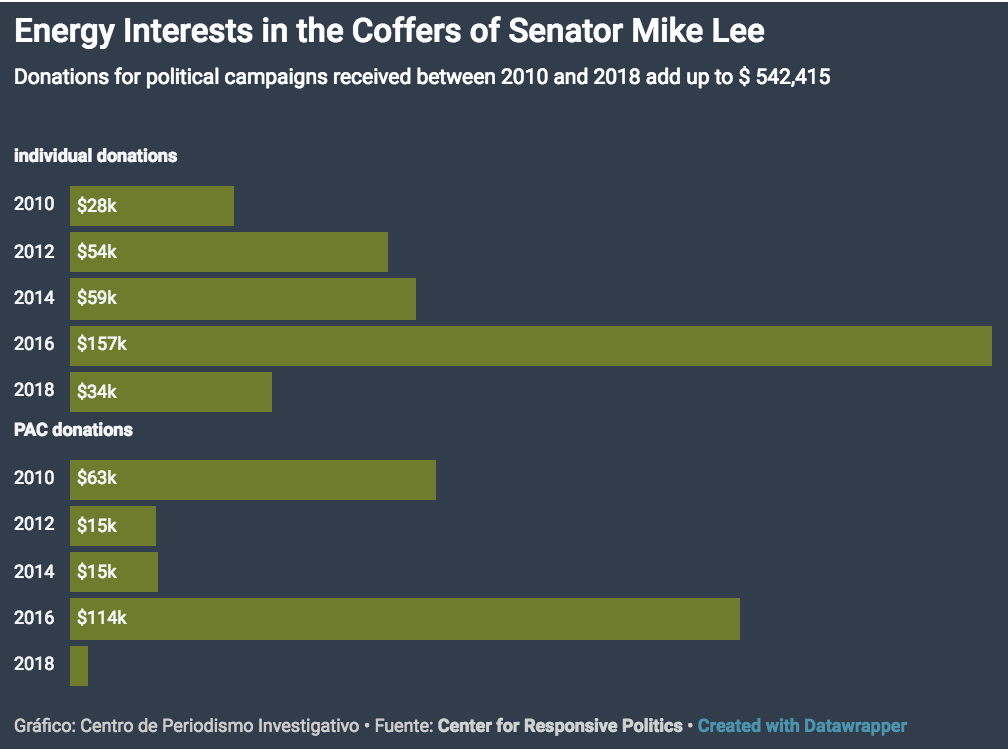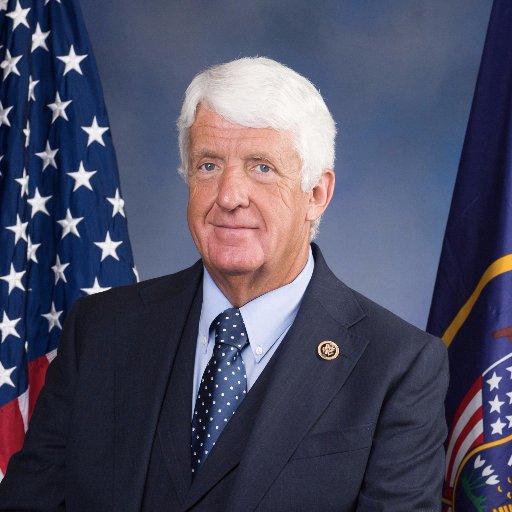

By Eliván Martínez Mercado
Republican Senators Jeff Flake of Arizona and Mike Lee of Utah sought to keep secret their interest in the privatization of the Puerto Rico Electric Power Authority (PREPA), a government-owned corporation.
Almost a month after Hurricane María destroyed the island’s energy grid, a representative of Sen. Flake began to send emails to Andrew Biggs, a conservative, pension expert who sits at Puerto Rico’s Fiscal Control Board (FCB), the federally appointed entity tasked with the island’s debt restructuring.
“The Flake and Lee offices have quietly been kicking around the idea of legislation to implement the PREPA privatization that members of the [FCB] have advocated,” wrote Chuck Podolak, a former adviser to Sen. Flake, in an email sent to Biggs. “We’re pretty new to the PREPA game and were wondering if we could grab a few minutes for a phone call with you to get some background on what thinking has been done on how to do this [the privatization],” he continued.
These communications with FCB members not only reveal the intention of both senators to secretly pull the strings of privatization from the federal sphere, but they also demonstrate the depth of the political subordination of the Puerto Rican territory before the U.S. They further show a lack of independence from the FCB, which is called to act by its own criteria.
The emails were obtained by Puerto Rico-based Center for Investigative Journalism (CPI), following a lawsuit brought in federal court against the FCB to access their communications with both the federal and local government.
“The purpose of fiscal control boards is precisely to remove the political factor to exclusively address financial problems,” explained Deborah Kobes, an MIT graduate with a doctorate in political economy and governability. She authored a dissertation on fiscal boards around the U.S. and their effect on democracy.
“This doesn’t mean that board members can’t interact with political players, but they can lose credibility if members are seen as a tool for them,” she told the CPI. Audit standards followed by the U.S. Government Accountability Office (GAO) —which also serve as a model for local governments— mandate that auditors and regulatory entities be free of influence, including political and ideological, that can compromise their objectivity.
On October 23, 2017, Sens. Flake and Lee delayed granting Puerto Ricosupplementary disaster-relief funds to Puerto Rico. They wanted to insert amendments beforehand, such as reforms in the energy sector. That same day, Sen. Flake’s former adviser, Podolak, insisted on talking to Andrew Biggs on the phone. He was seeking information about PREPA, while the Senate was discussing the allocation of disaster-relief money.
“With the relief bill on the floor on the floor this week, I think both Senators Flake and Lee may be interested in shining some light on PREPA,” Podolak said in an email, referring to his position that the public corporation should be privatized. “I hope to have an outline of some legislation soon to bounce off of you,” the adviser told Biggs in another email, in which he also asked for an introduction to Ana Matosantos, a budget expert and FCB member, to discuss public policy issues related to PREPA.
A day later, Matosantos had a message in her mailbox:
“Senators Flake and Lee have taken an interest in helping push some needed reforms to Puerto Rico’s energy sector, including PREPA privatization. They introduced an amendment to the supplemental disaster funding bill that is currently under consideration in the Senate, but due to some procedural roadblocks the path forward for it on this bill is uncertain.”
Podolak further told Matosantos that he had had a good conversation the previous day with Biggs, who suggested he talk to her. Podolak alleges in the message that he wants to make sure that the senators’ efforts were complementary to what the FCB was already doing.
Sens. Flake and Lee kept their push for PREPA’s privatization after receiving campaign donations from powerful global and U.S. corporations in the energy sector, as shown by data from Open Secrets, an organization that collects information on lobbying work and political donations. Pushing privatization out of public scrutiny while receiving that money raises questions about possible undue influence by those corporations, which seek to promote their interests as a reward for their donations, according to Craig Holman of Public Citizen, an activist group that lobbies in favor of governmental ethics and changes to political campaign financing rules.
From 2010 to 2018, outgoing Sen. Flake has received some $789,784 in donations from the energy sector. Companies that donated to him include ExxonMobil (a multinational oil and gas company), Duke Energy (a multinational electric utility and a commonwealth government contractor for the restoration of the energy grid after hurricane María) and Chevron (a multinational involved in the petroleum, natural gas and geothermal energy industry).


For his part, Sen. Lee’s donors from the energy sector feature Chevron, Halliburton (oil fields) and Koch Industries (natural gas and petroleum refining), from which he has received a total of $542,415 during the eight-year period.


Citigroup, the investment bank that will broker the proposed public-private partnership transaction for PREPA’s transmission & distribution network, donated a total of $11,400 to the campaigns of both senators in the same timeframe.
Promoting PREPA’s privatization while receiving money from the energy sector is not illegal. “But it’s unethical. It is a kind of subtle corruption. And it does the same damage to the integrity of our government,” Holman told the CPI. “This is a reflection of the poor ethical standards of the U.S. political system. It is an undue influence because they are giving money because they want something. This raises questions over these senators.”
Flake and his former adviser, Podolak, did not respond to an interview request. Sen. Lee’s press secretary said he would not comment.
Meanwhile, the Puerto Rico FCB’s communications team only accepted written questions for Biggs, partially answering them. Why there were direct communications with representatives of Sens. Flake and Lee over PREPA’s privatization? Was it acceptable that the senators delayed disaster relief after the hurricanes because they sought PREPA’s privatization?
“The Oversight Board maintains regular communications with multiple stakeholders, including Federal Government agencies and their officials, as well as Members of Congress and their staff. These communications are an integral part of the Oversight Board’s responsibilities, as established in PROMESA, given the importance of these officials and the impact of their determinations on all economic sectors of Puerto Rico,” stated the FCB as part of its answer to CPI’s inquiry. “The Board also believes that the Federal Government and Congress should not treat Puerto Rico differently from any other American jurisdiction with regards to the funding or provision of disaster aid.”
Some of the questions that the FCB communications team failed to respond included whether Biggs agrees having Congress lead an initiative to privatize PREPA. The Board also didn’t comment on Sens. Flake and Lee receiving more than $1.3 million in donations from energy sector companies, some of which could benefit from PREPA’s privatization.
“There Have Been so Many Interests Here!”
When he heard about the emails between the senators and the FCB, Tom Sanzillo, finance director of the Institute of Energy Economics & Financial Analysis (IEEFA), found it strange that the senators did not approach the board as part of the Senate Energy & Natural Resources Committee. They did it from their own offices. In addition, Podolak was not directly hired by the committee. He was an employee of Sen. Flake.
Podolak, a former Air Force pilot, holds a doctorate in geomorphology from Johns Hopkins University in Maryland. In March 2018, he started directing the contract and water rights division of Salt River Project, a state-owned company in Arizona that provides electricity and water services. Podolak is not a lawyer nor does he have financial preparation to discuss and advocate for the privatization of PREPA with Puerto Rico’s FCB, Sanzillo said.
“Why does a person like Podolak have to be involved in this process? Congress, as the author of PROMESA, has a legitimate interest in the debt issues of Puerto Rico, but this is not the way to exercise it,” Sanzillo said. “The legitimate way of Congress is to pass legislation for Puerto Rico if it asks for it. But to push at this moment a law that has no merit is a real problem. This action that you describe to me shows that Congress is acting inappropriately and damaging the independence of the Fiscal Control Board and the local government to fix the electrical system. Here we have two senators who are pushing policies on the Board that do not have a reason to be. That is inappropriate. They should stay out.”
Sanzillo argues that no one has given logical reasons to privatize the power utility. “Privatization has nothing to do with improving electrical services.”
IEEFA denounced in July that a group of congressmen were interfering in the privatization process, instead of staying outside so that the restructuring of Puerto Rico’s debt works without influences. IEEFA pointed at the Republican congressman for Utah, Rob Bishop, who has interceded in favor of natural gas interests for Puerto Rico. The priority must be to move the energy system toward more renewable sources, according to the organization.


Rep. Rob Bishop (Public Domain)
“There have been so many interests here!,” said New Progressive Party Sen. Larry Seilhamer, who co-sponsored Senate Bill 1121 to establish a new public energy policy that eliminates PREPA’s monopoly and opens the door to the participation of private, public and nonprofit sectors for the energy system. Seilhamer not only refers to the news of Flake, Lee and Bishop, but also to the attempts of Sen. Don Young (R-Alaska), who circulated a draft of his plan for the privatization of PREPA. “That’s why we have to assume the role in the Puerto Rico Legislature and clearly establish that the issue of energy is a matter that belongs to Puerto Ricans.”
In addition to the interference of lawmakers, there is a strong clash of powers between federal agencies and the local government. The U.S. Department of Energy has wrestled with Gov. Ricardo Rosselló Nevares for the lead in the restructuring of Puerto Rico’s energy system. The U.S. Corps of Engineers, which led part of the reconstruction of PREPA’s infrastructure, was criticized by Gov. Rosselló for excessive bureaucracy and a lack of urgency.
“We have to take the lead, establish the vision of Puerto Rico for its energy issue,” Seilhamer said. “And to the extent that we can provide clear and precise direction, that will make it easier for creditors to reach an agreement and for investors to feel comfortable. I have not received any kind of comment from the Board that this public energy policy bill should not be addressed. Everyone is waiting for the bill to be addressed and that it gives direction, which at the end of the day will define the economic development of Puerto Rico,” he added.
PREPA is restructuring its debt federal court, under the bankruptcy framework established by Title III of PROMESA. The public corporation released a request for proposals to create a public-private partnership to manage the energy transmission & distribution network, while it plans to offer for sale or as a concession its power generation plants.
Treasury Claims Gov’t Changed the Script
Before the hurricane, the struggle had already intensified between Puerto Rico’s elected government and the FCB over the leadership of PREPA’s transformation process. It was not the Board, but Gov. Rosselló, who made public on the afternoon of January 22 his plan to privatize PREPA. He spoke of the need to end years of mismanagement, corruption and frequent blackouts.
Natalie Jaresko, the FCB executive director, sent an email to Craig Phillips, an adviser to U.S. Treasury Secretary Steven Mnuchin, with news clipping about Gov. Rosselló’s announcement. When he found out, Phillips went off.
“There was no mention of doing this imminently,” he told Jaresko in reference to PREPA’s privatization announcement. “This communication pattern is not tolerable. I want to reach out to them to request a meeting to understand all of this. Who would you recommend that we contact?”
“I recommend Christian, but it is just what we described as our thoughts, ie Long term concession on T&D, privatization of generation assets,” Jaresko said.
“Who is Christian? Can I get his details and role to contact?,” Phillips asked.
“Christian Sobrino, the gentleman you met with, the Governor’s representative to the board and the Chairperson of AAFAF [Puerto Rico Fiscal Agency and Financial Advisory Authority],” Jaresko replied.
The Treasury adviser was doing a kind of supervision of the FCB and had forgotten the name of the only representative of Puerto Rico’s elected government in the Board. Sobrino, in fact, confirmed to the CPI that he had spoken with Phillips after Gov. Rosselló’s PREPA announcement. “I said, ‘look, Craig, sorry I could not give heads up about the announcement, but it was something that the governor was working on recently and did not want it a leak because it was a very important announcement for Puerto Rico, a big paradigm shift.’ And Craig told me, ‘look, you have our support. You can let me know what you are going to do.’ Craig let me know that he did not like the idea of finding out about things in the newspaper.”
It was not the first time Phillips had found out in the press about matters being discussed with the Puerto Rico government. In another email sent to Jaresko on December 28, 2017, Phillips complained about a statement by Sobrino in an article in which he claimed that the Rosselló administration was nearing an agreement with Treasury to obtain an emergency loan. Phillips said that Sobrino’s quotes in the press were the opposite of what had been discussed. “I can say from our perspective it is an exhausting communication strategy,” he told Jaresko. She tried to explain what Sobrino’s statements meant: “I can only believe they are playing to their domestic audience.”
Why does Phillips demand explanations in that tone for an announcement by the commonwealth’s elected government regarding a Puerto Rico public corporation? “When you’re talking about thousands of federal dollars, federal officials generally feel they must know everything that’s going on,” said Sobrino during an interview with the CPI. “There is also an additional element that can’t be denied and that is that Puerto Rico is a territory, there is a possessive element in all communications. And there is also the Board; things that are being announced that the Board does not know beforehand.”
Did the Board not know that the governor was going to make the PREPA privatization announcement? “No. The governor made a transcendental public policy statement for Puerto Rico. And it is ours, Puerto Ricans. It’s from the government of Puerto Rico. It is not imposed by anyone.”
The announcement also took Ahsha Tribble, the assistant regional administrator of the Federal Emergency Management Agency (FEMA), by surprise. She had been sent to Puerto Rico to lead from that agency issues related to infrastructure and energy reconstruction following Hurricane María. “There is interest to get some clarification on the intent to ‘privatize’ PREPA. I believe it would be helpful for you to explain the plan versus what is in a press release,” Tribble wrote on Jan. 27 to Noel Zamot, the Board’s revitalization coordinator, in reference to Gov. Rosselló’s announcement.
Until then, the FCB had been considering selling PREPA as a whole, supposedly to lower the costs of electricity, which would have entailed ending a public monopoly to create a private one. “That, I understood, was going to be a big mistake. In December 2017, the former members of the PREPA board of directors began to see other models of privatization, such as Long Island, where the transmission and distribution of the generation are separated,” Sobrino explained. That model was the one that prevailed in Gov. Rosselló’s proposal.
In Congress, meanwhile, the debate over PREPA had already begun. According to Sobrino, he did not know about Sens. Flake and Lee’s plan. He did know about the proposal of Alaska’s GOP Rep. Don Young, pushed by corporations that understood that the best way to do the privatization was by enacting a federal law and opposed having the local government of Puerto Rico leading the public corporation.
Who are these investors?
“I must refrain from saying who they are because they may be participating right now in the bidding process for the public-private partnership of PREPA’s power transmission and distribution system and I do not want to affect that process. But I do remember that someone from the energy company Shell was involved. They came to visit me once and I was very candid and told them that this privatization is going to take place, but through a local law, in an open process, and that we do not appreciate that they are lobbying for this type of measures, such as privatization from Congress, because it does not add trust to the process.”
Comments to emartinez@periodismoinvestigativo.com
This is the second story of the series Puerto Rico Fiscal Board’s Emails.


